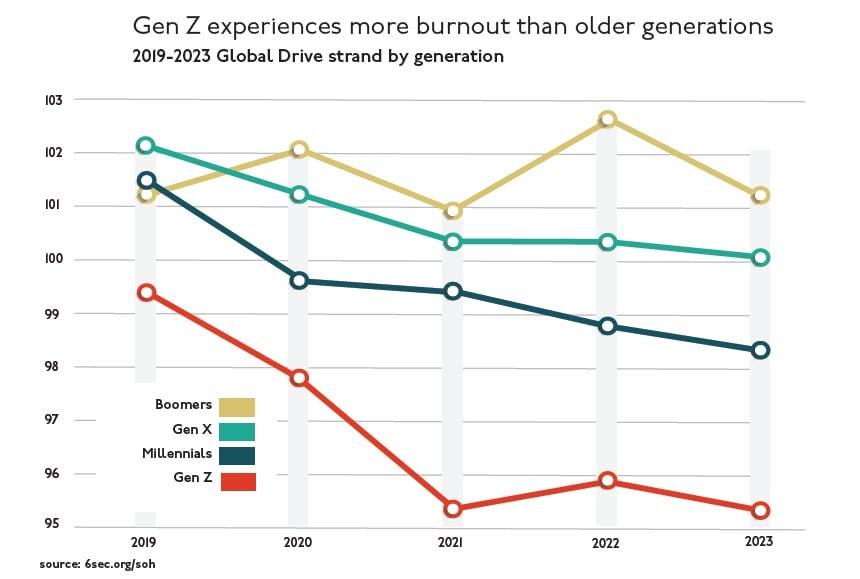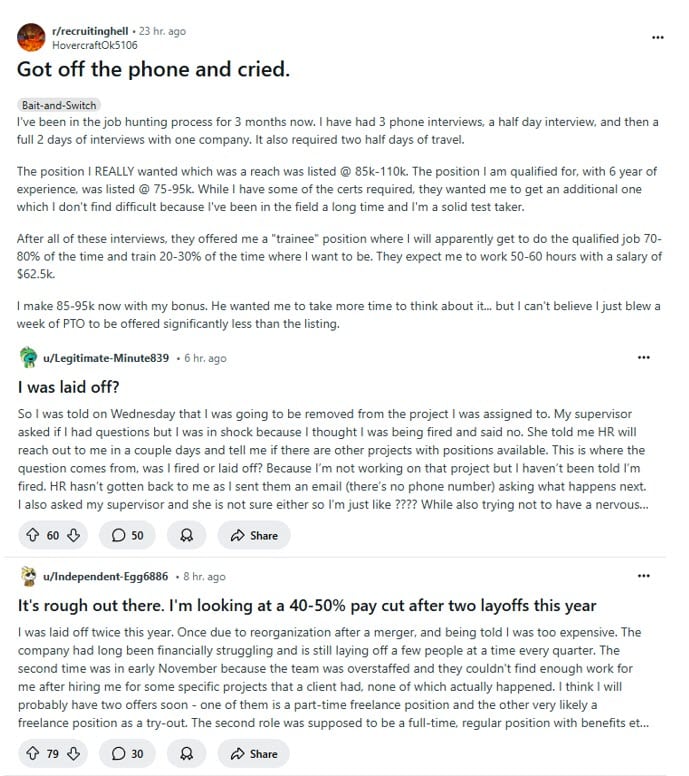A Tumultuous Year Behind: A Challenging, Important 2025
2024 has been a rough and tumble year. We watched two major wars (Ukraine and Gaza), the breakdown of the Syrian regime, and a record-breaking year of floods and hurricanes. Crypto emerged as a viable, highly valued asset class and the world wrestled with inflation. And right-wing politicians won major elections, including in the United States.
Where does this lead us for the year ahead?
As I look back, I reflect on a few major topics, each as signals for our 2025 priorities.
1. Workers are experiencing palpable worries about employment and low trust in our institutions.
The stress of war, global warming, and politics has impacted people. Not only did an activist shoot the CEO of a major healthcare company, we saw assassination attempts, school shootings, and a “recession in emotional intelligence,” as one study shows.
Of course not everyone is bummed out, but research shows that young people find it tough. The study found that GenZ’s ability to navigate emotional range dropped 16% in the last four years. This ability, that of “maintaining a sense of purpose in a world of change”, reflects a sense of worry among our younger workforce.
 |
Another study that found similar results was Adecco Group’s 2024 global workforce survey. This global survey, which reached 240,000 workers of all types, found that 40% of workers are worried about job stability (with AI the #1 fear factor), and 77% expect their employer to help. I haven’t seen this level of “expectation” put on employers in a long time.
Supporting this, most employers tell me their “quit rate” has plummeted. While a third of employees quit jobs during the recession, almost nobody wants to leave now, concerned about the challenges of finding another job. So bottom line: 2025 is a time to focus on employee experience.
2. The labor market is split in two: Labor shortages in frontline work; growing layoffs in white collar work.
While macro economists point to the low unemployment rate and high level of job creation, my research shows a different story (discussed in the podcast).
The unemployment rate for hourly workers, healthcare, blue-collar, construction, and front-line workers is extremely low. Employers tell me they’re constantly struggling to hire, and front-line turnover is a major business challenge. So after years of outsourcing and automation, we’re at a point where the front-line worker is in high demand.
For white collar workers, however, the opposite is true. Not only do I know many marketing, sales, and engineering professionals who are worried about finding a job, the r/recruitinghell and r/AskHR group in Reddit, which now have 2.5 million users, is filled with frustrated white collar workers looking. When I talk to individuals I know, I hear lots of fear about looking for a new job.
 |
Why is this happening? The “hopes for AI” have already created a “white collar” job slowdown. A major study in Bloomberg just showed that the top 84 companies in the US reduced white collar headcount by 127,418 people last year. (And more than a quarter of these were black, so the new “anti-DEI” movement is directly impacting black workers.)
 |
If 2025 continues like this, we’re going to see much more dislocation in white collar work. (And that includes people like me, who make my living doing research and analyzing data!)
As we’ll explain in January, this creates what I call “The Rise of the Superworker,” a new focuse on job and org redesign and employee development in the coming year.
For those of you in Talent Acquisition, your job is going to get even harder: scarcity of workers in front-line positions; uncertainty and competition for white-collar jobs.
3. We’ve seen a spectacular maturation of AI, forcing everything else to catch up.
I don’t need to repeat all the AI announcements, but suffice it to say I have never seen so much technology mature so fast.
In one year we want from “5% of companies experimenting with AI” to “95% of companies and workers experimenting with AI.” Satya Nadella calls it “the fastest diffusion of technology in our lifetime,” and I have to agree.
Yes, AI is getting smarter, more agentic, and more super-intelligent every day. And this explosively fast evolution created a whole bunch of “lagging issues” that have not been able to keep up.
- We don’t have enough energy or compute capacity, creating a race for machine rooms. According to one study, the US now has 58 major IT data centers sprinkled around, more than the rest of the world combined. I never thought I’d see Three Mile Island restarted (I studied energy science in college), and we’re soon to have “mini-nuclear reactors” running power plants around the world. The CEO of PG&E, our big utility in California, just told analysts she is “thrilled” that demand is going up, because that lets utilities invest in more capital infrastructure at lower cost.
- We don’t have IP and legal systems to handle data loss. I personally am a bit unhappy that ChatGPT seems to have “hoovered up” a lot of our research. (That’s why we built Galileo, by the way.) But we can look at it as marketing. If you’re a media company or a YouTube channel, your days are numbered. And that goes for online learning companies, educational institutions, and lots of other IP providers. These laws have to get fixed.
- We don’t have any idea what “Agents” will do in partnership with humans. Despite Marc Benioff’s announcements and hype by VCs, companies are barely getting started with “agentification.” The agentic sales messages I keep getting from Manpower are total junk. Yes we’re learning fast, but it’s hard to find an AI “agent” that’s out of the box ready to go – these things take training, tuning, and lots of support.
- Despite lots of promise, we don’t what AI will do to management. Can AI eliminate a human coach or manager? It may have promise, but the jury is out. Yet in other areas AI is paying off fast. Can AI do our performance reviews and development plans? Yes, for sure. And companies like Paradox have built near-autonomous recruiters. Lots of work to do next year. (Listen to the new world of AI recruitment here.)
- Unbelievable amount of vendor hype. But which vendors will survive? Nobody knows quite yet, we just have to learn and test in the year look for high-ROI solutions that work.
Ultimately we’re very optimistic about the impact of AI, and our new 100 Use Cases for Galileo will blow your mind. But there’s lots of learning to come.
Bottom line here, as we all know, is to learn, experiment, and redesign your team around AI.
4. HR functions are now forced to step up.
Given the stress among employees, the workforce, and the role of AI, we have no choice but to step up.
As I discuss in the podcast, it’s time for HR to grow up. We’re going to have to learn about AI quickly, implement simpler systems, and operate as consultants to the business. And we’re going to be forced to address the stress in the workforce. My latest podcast explains the new imperative. Read all about SystemicHR® to understand more.
The Bottom Line: 2025 Is About Citizenship
As I think through the challenges and issues this year, one word comes to mind: Citizenship. Of all the things we do in 2025, the most important of all is to take care of the big things. Being a good citizen means taking care of employees, treating job candidates fairly, finding new jobs for people, and investing in ethics, truth, transparency, and equity.
One of the most highly esteemed Greek Stoics was Pythagoras, who is famous for his “Golden Verses.” Among his many wisdoms, Pythagoras top five quotes may help.
- “First worship the Immortal gods, as they are established and ordained by the Law.” (Follow the rules and laws, regardless of your personal opinion.)
- “Honor likewise your parents, and those most nearly related to you.” (Honor those before you, those around you, and your family.)
- “Do nothing evil, neither in the presence of others, nor privately; But above all things respect yourself.” (Behave ethically above all else, practice self-improvement.)
- “Never allow sleep to close your eyelids, after you went to bed, Until you have examined all your actions of the day by your reason.” (Always strive to learn, improve, and correct yourself.)
- “In what have I done wrong? What have I done? What have I omitted that I ought to have done?” (Constantly ask “how could I have been better?”)
Pythagoras reminds us that our own lives are not long, so each day we much strive to do the “right thing.” And with all the conflict we experience, this philosophy keeps us focused.
Our job in HR is to help our leaders and organizations practice this kind of citizenship. In a year of tumultuous change, Citizenship will serve us well.
What’s Next From Us
Early next year we’re launching a major research study on the adoption of AI in organizations, “The Rise of The Superworker.” If you have time over the holiday I encourage you to read some of the studies I mentioned, and sign up for the AI in HR curriculum in The Josh Bersin Academy. And make sure you look at Galileo™, it’s the best tool in the market to prepare you for what’s ahead.
References In The Article and Podcast
State of the Heart: Emotional Intelligence In Recession
Layoffs in 2024: 84 Global Companies Slow Hiring of Black Americans
Why Trust In America Is Decreasing
Addeco: Working Through Change: How AI Is Changing The Workforce
How AI Will Revolutionize The HR Department, In Detail. E205 (Podcast)
Digital Twins, Digital Employees, And Agents Everywhere
Introducing The AI Trailblazers! HR Technology Outlook 2025.
Can AI Do Performance Reviews? Rippling Says Yes.
AI in HR: Certificate Program in The Josh Bersin Academy
The Road to AI-Powered Productivity: Four Stages of Transformation
Digital Twins, Digital Employees, And Agents Everywhere
Galileo™ Professional, The Essential AI Assistant for Everything HR
